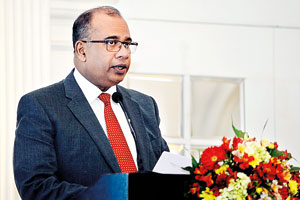News
‘Police, armed forces must ‘respond’ and not ‘react’ to lawful protests’
View(s):SC Judge Yasantha Kodagoda addresses gathering at the launch of the Human Rights Commission of Sri Lanka’s ‘Recommended Guidelines to the State and Law Enforcement Officials on dealing with Civilian Protests’
By Nathara Abeywickrema
As a lawful protest is a legitimate form of exercising the fundamental right to freedom of expression and free speech and peaceful assembly and freedom of association, the responses of the police must be strategised to interdict only illegal activity, while permitting what is lawful, said Supreme Court Judge Yasantha Kodagoda, PC, on Friday.
“The police and the armed forces must ‘respond’ and not ‘react’,” Justice Kodagoda observed, adding that their response must be carried out within the framework of the law, as prescribed by law, and in a manner not exceeding the authority conferred on them by the law.

From Left to right: Sarath Jayamanne PC, HRCSL Chairperson Justice Rohini Marasinghe, Justice Yasantha Kodagoda, Former Chief Justice Asoka De Silva and HRCSL commissioner Anusuya Shanmuganathan. Pix by Indika Handuwala
He was making the address as the Chief Guest at the launch of the Human Rights Commission of Sri Lanka’s ‘Recommended Guidelines to the State and Law Enforcement Officials on dealing with Civilian Protests’ at the Galle Face Hotel.
“The responses must be not only lawful in the strict sense of the word, but must also be necessary, carried out in good faith and in a manner that is proportionate to the harm that is being caused or likely to be caused by those engaged in illegal activity,” Justice Kodagoda pointed out.
They should not take the form of punitive action, such as causing physical or psychological harm to even those who may be violating the law. “Action against perpetrators of violence must also be carried out in a lawful manner, while upholding the fundamental rights of those who have committed offences,” he maintained. “The response of the Police must not be orchestrated by political motives towards the suppression of lawful protests or suppression of other forms of dissent which are being expressed through lawful means.”

Chief Guest Justice Yasantha Kodagoda, PC
“If there are transgressions of the law, committing of offences and perpetration of violence, the rule of law demands that the police bring the situation under control, and enforce the law with regard to incidents which amount to the committing of offences,” Justice Kodagoda said.
It would also be in public interest for the police to take necessary action to prevent violations of the law,” he asserted. “If there exists an imminent likelihood of violence being perpetrated, necessary action must be taken to prevent a breach of the peace and transgressions of the law.”
“We cannot overlook the ground reality of certain circumstances which arise during certain protests, necessitating the need to use reasonable force for the purpose of enforcing preventive measures and dispersing unlawful assemblies,” he said. “Therefore, the Police, possibly aided by the Armed Forces (in situations where the armed forces have been lawfully mobilised), must respond to the outbreak of violence, as well as in situations where there exists a realistic and imminent likelihood of violence erupting.”
The HRCSL compiled the Guidelines under the Human Rights Commission of Sri Lanka Act of 1996. The Commission has been vigilantly monitoring civilian protests, particularly last year, Rohini Marasinge, Retired Supreme Court Judge and HRCSL Chairperson, told the gathering. The Commission heard complaints by protesters and conducted inquiries into the human rights violations in relation to the protests.
In addition to providing legal redress, HRCSL took proactive measures to safeguard the right to peaceful protest and to prevent the violation of fundamental rights enshrined in the Constitution, Justice Marasinghe said.
“Individuals have every right to peaceably protest, and the departments and officers should start with the understanding that their principal role is to facilitate individuals’ right to expressing themselves while protecting protestors and public safety,” said Sarath Jayamanne, PC, former Director General of the Commission to Investigate Allegations of Bribery and Corruption.
| Guidelines at a glance The guidelines reiterate the fundamental rights recognised and guaranteed by the Constitution of Sri Lanka in relation to the right of peaceful assembly. They seek to prevent and address violations which occur in the context of public protests and ensure accountability of the State in general and law enforcement officials in particular. The framework contained in the recommended guidelines establishes: –that protesters will not be subject to torture or cruel, inhuman or degrading treatment or punishment under any circumstance; –that protesters are entitled to freedom from arbitrary arrest, detention, and punishment; –that the exercise of the rights guaranteed in the constitution is subject only to restrictions as provided by law in the interests of national security; –that all persons are equal before the law and are entitled, without any discrimination, to the equal protection of the law. In this respect, the law shall prohibit any discrimination and guarantee to all persons equal and effective protection against discrimination on any grounds such as race, religion, language, caste, sex, political opinion, place of birth or any such grounds; –that every citizen has the right to freedom of expression, including freedom of peaceful assembly. The recommended guidelines also ensure that no restrictions are placed on the exercise of the above rights other than those prescribed by law and necessary in the interest of national security or public safety, the protection of public health, the protection of racial and religious harmony, or the protection of rights and freedom of others.
| |
The best way to say that you found the home of your dreams is by finding it on Hitad.lk. We have listings for apartments for sale or rent in Sri Lanka, no matter what locale you're looking for! Whether you live in Colombo, Galle, Kandy, Matara, Jaffna and more - we've got them all!

